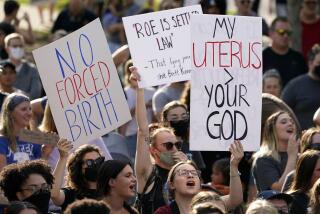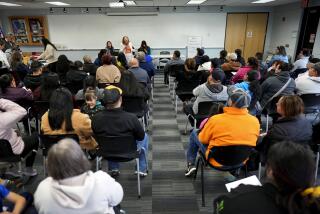Weeding the Iowa Garden
- Share via
The Iowa caucuses perhaps told the nation more about Iowa and Iowans than they did about the presidential candidates. Voters in that Midwestern farming state generally supported candidates from the Midwest who tried to tell Iowans what they wanted to hear about helping the family farm and about foreign trade. Thus, Republican Sen. Bob Dole of Kansas and Democrats Rep. Richard Gephardt of Missouri and Sen. Paul Simon of Illinois were expected to do well, and they did.
Iowa also is a state in which Reagan Administration policies have been highly unpopular. This sentiment clearly hurt Vice President George Bush and helped Dole.
Except for the surprise of former evangelist Pat Robertson, the outcome might have been just about the same six months ago as it turned out to be on Monday. How to account for the Robertson phenomenon? Will its momentum carry into New Hampshire and other states?
Robertson attracted thousands of political newcomers to his self-styled campaign of moral vision because caucus-goers did not have to be registered voters. It will be much more difficult in primary elections in other states where the rules are not nearly so flexible. Now that so much attention is focused on Robertson, his campaign will be subjected to greater scrutiny, and many potential supporters are likely to find it lacking in substance.
Among Democrats there was some lament that Iowa did not produce a front-runner, but three candidates bunched at the top: Gephardt, Simon and Massachusetts Gov. Michael S. Dukakis. Iowa has given unknowns credibility in the past, but is not a kingmaker. Choosing a party’s presidential nominee is a complex matter, and should be. What Iowa does is to start the process of sifting out the weaker candidates. On Monday it clearly winnowed out Gary Hart and made it difficult for former Arizona Gov. Bruce Babbitt to carry on his campaign much longer. Jesse Jackson did, however, make a credible showing with his 11%.
Another effect is to put pressure on Gephardt to justify his pandering to fears over foreign trade and his late-blooming pseudo-populism. Populism has been an effective political force in the past, but mostly in a negative sense. The nation needs a President in 1989 who builds a constructive, positive program for the future.
The major message from Republicans seems to be that George Bush has failed to define his campaign. Iowa demonstrates that Bush cannot just act vice presidential and sincere and mimic Ronald Reagan. Bush has been strong in New Hampshire, but he will have to put some beef into his campaign during the coming week to avoid serious slippage. Another major victim of Iowa was New York Rep. Jack Kemp, whose unreconstructed supply-side economics hokum attracted just over one of every 10 Republicans.
Contrary to all the carping, a small tribe of political crazies in Iowa does not pick American Presidents. What Iowans do is start the process on its way with a little snipping and paring and by establishing a new set of expectations for the candidates as they proceed down the road. As it happened on Monday, Iowans fulfilled that function pretty well.
More to Read
Get the L.A. Times Politics newsletter
Deeply reported insights into legislation, politics and policy from Sacramento, Washington and beyond. In your inbox twice per week.
You may occasionally receive promotional content from the Los Angeles Times.










